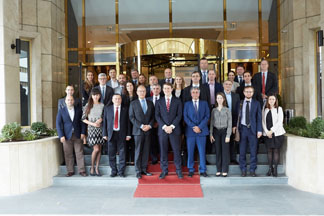NATO and partners discuss border security in Eastern Europe
Practitioners, think-tankers and high-level government officials gathered on 3 and 4 October 2016 to discuss defence-related border security issues in the breakaway regions during a conference in Chisinau, Moldova. The workshop – the second in the series – offered the opportunity to identify shared experiences and lessons learned. It also allowed to create a community that addresses issues beyond the event itself and promotes practical attempts towards long-term solutions in the field of border security.

The topic of the conference was timely as tensions on borders arise in many regions of Europe and threaten peace and stability in the Euro-Atlantic area. “The theme of border security has gained momentum – the Alliance has recognised that its security does not begin at their external borders but at their partners’ borders,” stated Mr Michael Gaul, Senior Advisor in NATO’s Emerging Security Challenges Division, during his opening speech. “NATO fully supports Moldova’s reform efforts. This policy has been reflected by practical steps when at the 2014 NATO Summit in Wales, Moldova was invited to take part in the newly launched Defence and Related Security Capacity Building (DCB) Initiative.”
The event was well-located, taking place in Moldova, a country that remains at the centre of international attention as current developments cause key players to question which direction the country will take in the near future. The protracted conflict in the breakaway region of Transnistria still remains unsolved after 25 years. Actions need to be taken in order to successfully foster long-term stability in Moldova and beyond its borders. With countries such as Ukraine and Georgia experiencing similar challenges, a mutual lessons-learned exchange is crucial. Christian Moelling, Senior Resident Fellow at the German Marshall Fund of the United States, highlighted during the workshop that – with other conflicts and crises arousing around the world – the international community might shift its focus to other areas and less attention will be paid to these regions. These regions need to prepare for such circumstances and need to ask themselves how they will respond to this situation. This became one of the key messages of the conference. However, these efforts need to be supplemented to establish long-lasting peace and stability. As Ambassador Ünal Çeviköz, Chairman at the Ankara Policy Center, concluded, “A better coordination between Romania, Bulgaria and Turkey could improve a regional approach to security in the Black Sea”, while proposing a new 3+ format. “NATO members Romania, Bulgaria and Turkey form the core and meet with Moldova, Ukraine and Georgia to foster regional problem-solving and cooperation.”
Similarly, a new concept for advancing border security in the Black Sea region was proposed also by the First Deputy Head of Ukraine’s State Border Guard Service, Lt Gen Vasyl Servatiuk, during the event. He suggested to “revise the present strategy of border security in the Black Sea region, under the auspices of NATO, paying mainly attention to international terrorism fighting, counteraction of illegal weapon trafficking and circulation, prevention and combating smuggling activity (including CBRN), as well as to securing the international marine transport routes. In order to revise the strategy,” he continued, “international experts should be involved as well as partnerships between Ukraine, Moldova, Romania, Bulgaria, Turkey and Georgia should be fostered.”

Conclusions from this workshop as well as from the workshop held in Ukraine earlier this year will be summarised in a policy paper and presented at a Berlin conference in December.
The workshop entitled ‘Border Security in Eastern Europe: Lessons for NATO and Partners’ was organised by the German Marshall Fund (GMF) of the United States, in cooperation with the Foreign Policy Association (APE) and the Institute of World Policy (IWP), and supported by the NATO Science for Peace and Security (SPS) Programme. The Deputy Prime Minister for Reintegration of Moldova, Mr Gheorghe Balan, and the Deputy Minister of Foreign Affairs of Moldova, Ms Daniela Morari, attended the conference. The event comprised a policy dinner and roundtable workshops of around 30 senior officials and experts from over a dozen countries in Europe and North America.
